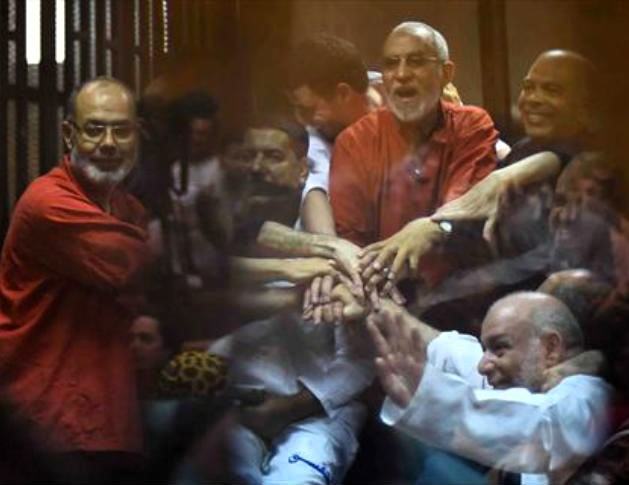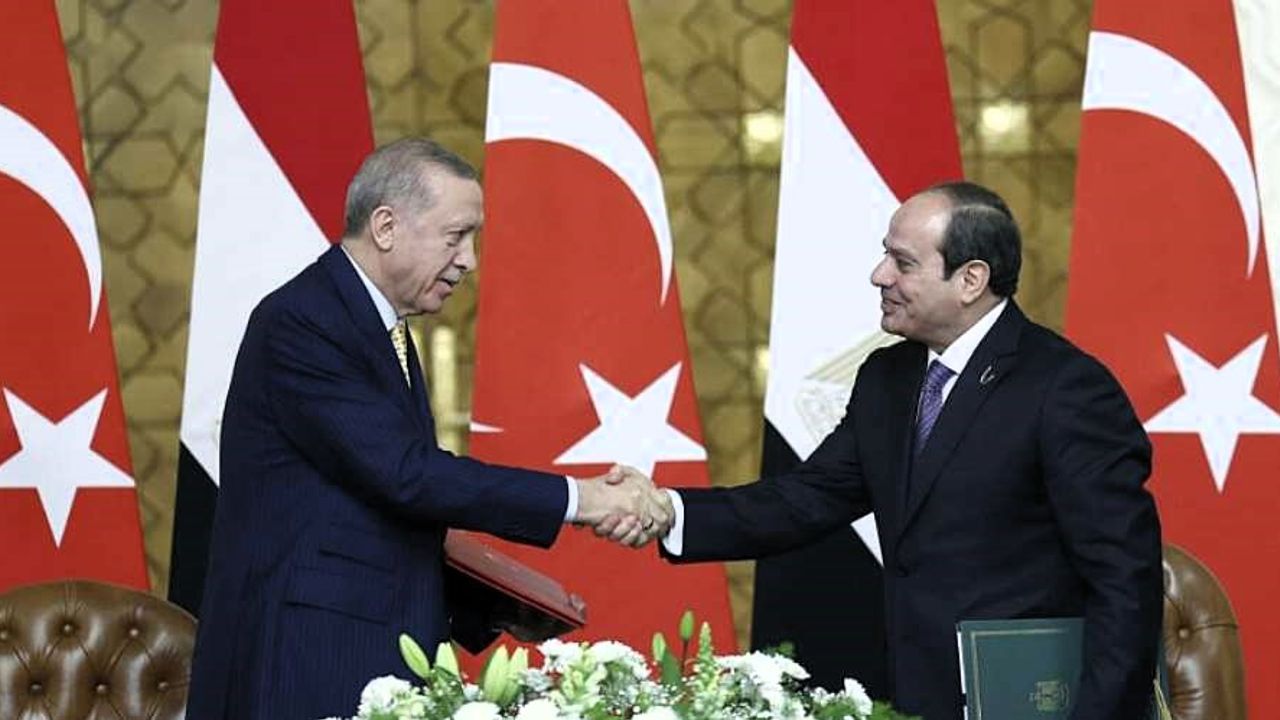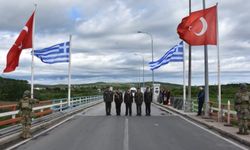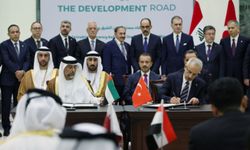Mısır Mahkemesi, Muhammed Bedii ve el-Biltaci'nin de aralarında olduğu üst düzey 8 Müslüman Kardeşler (İhvan) yöneticisine 2013'te Rabia Meydanı'nın yakınındaki olaylar nedeniyle idam cezası verdi.
Bilindiği üzere Sayın Cumhurbaşkanı Recep Tayyip Erdoğan, 14 Şubat 2024 tarihinde Mısır’a resmî bir ziyaret gerçekleştirdi.
Ziyaret sürecinde; Sayın Cumhurbaşkanı Erdoğan ve Mısır Cumhurbaşkanı Sisi, Yüksek Düzeyli Stratejik İşbirliği Konseyi Toplantılarının Yeniden Yapılandırılmasına İlişkin Ortak Bildiriyi imzaladı. Erdoğan, 2 ülkenin ticaret hacmini kısa süre içinde 15 milyar dolara çıkarmak için mutabık kaldıklarını belirtti.
Türkiye'nin Darbeci Sisi İle 14 Şubat 2024 tarihinde yapılan ekonomi ve strateji temalı görüşme ve imzalanan anlaşmaların sonrasında Darbeci Mısır rejimi, Ramazan öncesi Müslüman Kardeşler 'in 8 yöneticisi hakkında verilen idam kararları,bir yandan insani vicdana sahip olan herkesin yüreklerini sızlatırken; diğer yandan Türkiye Hükümetinin yeniden kandırıldığına dair akıllarda soru işareti bıraktı.
Mısır Mahkemesi, 2013 yılında askeri darbenin ardından Rabia Meydanı'nda düzenlenen oturma eylemi nedeniyle bölge çevresinde çıkan olaylara ilişkin davada üst düzey Müslüman Kardeşler (İhvan) yöneticilerini idam cezasına çarptırdı.
Mısır haber ajansı MENA'nın aktardığına göre, 2013 yılında Rabia Meydanı'nın yakınındaki Manassa bölgesinde yaşanan olaylarla ilgili davanın duruşması bugün Olağanüstü Devlet Yüksek Güvenlik Mahkemesi'nde yapıldı.
Mahkeme, İhvan ve Cemaat'ül İslamiyye teşkilatından 8 yönetici hakkında idam cezası verdi.
İdam cezasına çarptırılanların 80 yaşındaki İhvan Rehberlik Konseyi Başkanı Muhammed Bedii'nin yanı sıra, Muhammed el-Biltaci, Mahmud İzzet, Amr Muhammed Zeki, Üsame Yasin, Saffet Hicazi, Asım Abdulmacid ve Muhammed Abdulmaksut olduğu ifade edildi.
Duruşmada 37 sanık müebbet hapis (25 yıl), 6 sanık 15'er yıl ağırlaştırılmış, 7 sanık 10'ar yıl ağırlaştırılmış hapis cezasına çarptırılırken, 21 sanık da beraat etti.
Mahkemenin hükmüne temyiz yolunun açık olmadığı belirtildi. Mısır'da daha önce de İhvan yöneticileri hakkında idam kararları çıkmıştı ancak bunlara temyiz yolu açıktı.
Mısır yasalarına göre, idam hükmü cumhurbaşkanının onayından sonra infaz ediliyor. Cumhurbaşkanının, idam cezasını, hapis cezasına indirme veya hükümlüyü affetme, cezanın infazını durdurma ve hükümlünün serbest bırakılmasına karar verme yetkisi bulunuyor.
Mısır’da eski Cumhurbaşkanı Muhammed Mursi’nin 3 Temmuz 2013'te darbeyle görevden alınmasının ardından Rabia Meydanı’nda eylemler başlamış ve 14 Ağustos 2013 tarihine kadar sürmüştü.
Müslüman Aktivistler ve Derneklerden Ses Çıkmazken Uluslararası Af Örgütü'nden Mısır'a İdam Tepkisi
Uluslararası Af Örgütü, Mısır'daki darbe karşıtı 8 sanığa verilen idam kararına ulusal ve uluslararası hukukun hiçe sayıldığı gerekçesiyle tepki gösterdi.
Af Örgütünden yapılan açıklamada, bugünkü kararın Mısır'ın ulusal ve uluslararası hukuku hiçe sayması anlamına geldiği belirtildi.
Uluslararası Af Örgütü'nün Ortadoğu ve Kuzey Afrika Direktör Yardımcısı Hassiba Hadj Sahraoui, eylem öncesi yaptığı açıklamada:" bugün verilen idam kararlarının, Mısır'ın "adalet sisteminin çarpıklığına başka bir örnek daha oluşturduğunu" kaydetti.
Sahraoui, "Mahkeme kararları ve hükümler bozulmalı, mahkum edilenler uluslararası standartlara uygun, idam cezasının olmadığı mahkemelere çıkarılmalıdırlar. İdam cezası her koşulda, acımasız ve insanlık dışı bir cezadır. Yargılamanın adilliği üzerinde ciddi şüpheler varken zorla ölüm uygulamak, korkunçtur ve uluslararası hukuku hiçe saymaktır" ifadelerini kullandı.
Sahraoui ayrıca, duruşmaya halkın veya sanıkların ailelerinin katılımına izin verilmemesinin, ulusal ve uluslararası hukuka aykırı olduğunun altını çizerek, idam cezasının ülkede "rutin bir politika haline geldiğini" belirtti.
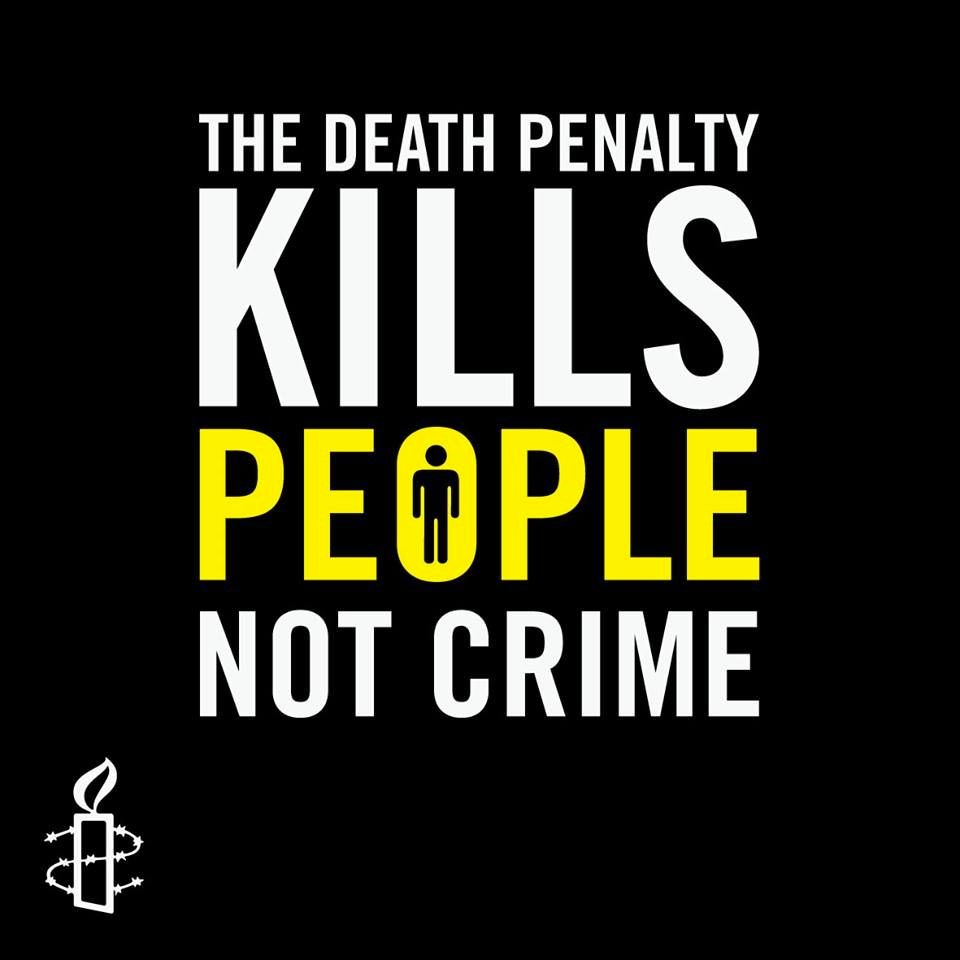
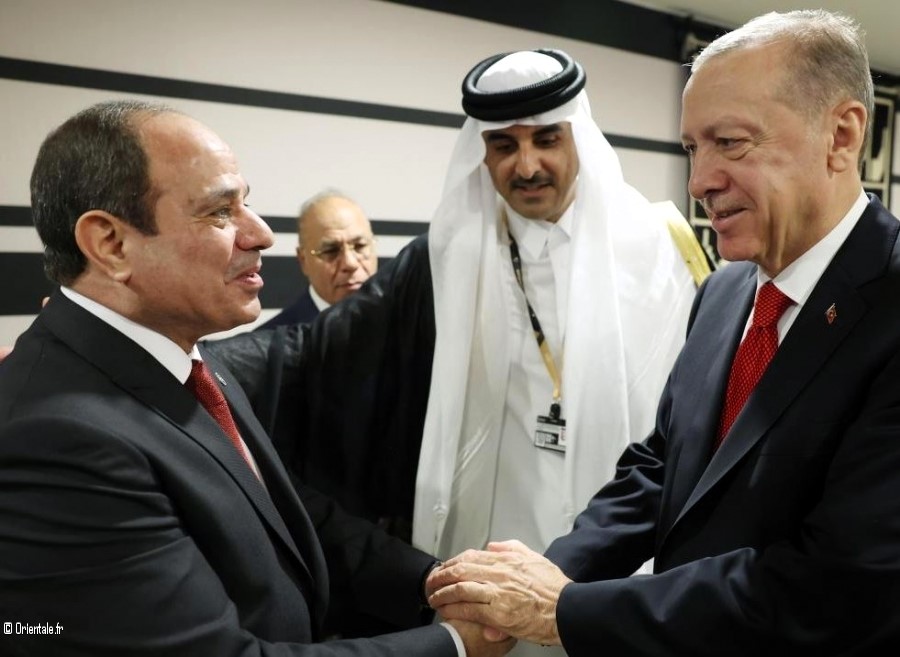
Egypt confirms death penalty for eight opposition politicians after mass trial
Those on death row include senior leaders of the Muslim Brotherhood and other politicians elected before the 2013 coup that brought President Sisi to power.
An Egyptian court sentenced senior opposition leaders to death on Monday in a case that has been decried as "politically-motivated" by rights groups.
The Supreme State Security Court, headed by Judge Mohamed El-Saeed El-Sharbini, issued the verdict to execute eight leading members of the opposition after a three-year-long mass trial involving 79 defendants.
Ahmed Attar, director of the Egyptian Network for Human Rights, said the verdicts were "politically motivated".
"The defendants have faced serious legal violations, including arbitrary detention, torture and denial of legal representation, in contravention of the constitution and due process," he told Middle East Eye.
"The Supreme State Security Court is an exceptional court that does not adhere to fair trial standards. It is based on emergency laws, and its judgments, once endorsed by the military ruler, are final without the possibility of appeal," he added.
Those on death row include the head of Egypt's largest opposition group, the Muslim Brotherhood, Mohamed Badie; the group's acting leader Mahmoud Ezzat; former MPs Mohamed El-Beltagy and Amr Mohamed Zaki; former minister Osama Yassin Abdel Wahab; Salafi preacher Safwat Hamouda Hegazy; Assem Abdel-Majid; and Mohamed Abdel-Maqsoud Mohamed.
Badie's 38-year-old son Ammar and Beltagy's 17-year-old daughter Asmaa were among hundreds of protesters killed by security forces in the month following the July 2013 coup led by then Defence Minister Abdel Fattah el-Sisi.
The eight defendants were initially sentenced to death in May 2023, and the ruling was referred to the Grand Mufti of Egypt for his legally non-binding ratification.
The case is titled "The Manassa Events" in reference to the Manassa Memorial "massacre", in which 95 anti-Sisi protesters were killed on 27 July 2013.
No police officer has been prosecuted for the killings, despite multiple reports by rights groups suggesting the killings were a disproportionate use of force.
Human Rights Watch documented the killings in a report in 2017, in which it said the mass killings of protesters that day and other similar incidents in the summer of 2013 were possible crimes against humanity.
Also referred to as case no. 9/2021, the Manassa trial saw 79 people charged with a range of crimes, including leadership in a terrorist group, preventing state institutions and public authorities from performing their duties, and attempting to change the regime by force.
The defendants were additionally accused of "committing crimes of murder and attempted murder for terrorist purposes, possessing firearms and ammunition without a licence, thuggery, blocking roads, displaying force to intimidate citizens, and deliberately sabotaging public and private properties and setting fires intentionally in public and governmental facilities".
In addition to the death sentences, the court also sentenced 37 others to life imprisonment, six defendants to 15 years of rigorous imprisonment, and seven defendants to 10 years of rigorous imprisonment. A sentence of rigorous imprisonment usually involves hard labour.
Of the 79 charged, the court acquitted 21 defendants.
Badie, the most senior Brotherhood member on trial, went on hunger strike last year in protest against alleged mistreatment and medical negligence in jail.
Persecution of the opposition
The government of President Abdel Fattah el-Sisi, who came to power after ousting his predecessor Mohamed Morsi in a military coup in 2013, has overseen a ferocious crackdown on members and supporters of the Muslim Brotherhood over the past decade.
Morsi was a leading member of the Brotherhood. Hundreds of his supporters were killed by security forces during protests in 2013 opposing Sisi's coup, and many of those who survived were detained and prosecuted on terrorism charges.
The crackdown included mass arbitrary detentions and subsequent mass trials over alleged political violence.
Human Rights Watch has previously called for quashing other death sentences connected to several mass trials of opposition leaders, most of them affiliated with the Brotherhood.
El-Beltagy, Yassin and Hegazy were sentenced to death in another mass trial in 2021.
Egypt was the top issuer of the death penalty in 2021, according to Amnesty International. It was also the second worst executioner after China that same year, a report by the rights group said.
Egyptian jails hold an estimated 65,000 political prisoners, arrested for their opposition to the government of President Sisi, according to a report by the Arabic Network for Human Rights in March 2021.
Hundreds of people have perished in prison since Sisi's coup due to medical negligence, including Morsi and former MP Essam el-Erian.
This article is available in French on Middle East Eye French edition.
